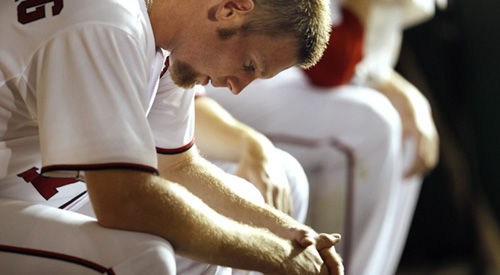
The human factor: Why shutting down Strasburg works
Washington Nationals General Manager Mike Rizzo is a man of his word.
Stephen Strasburg, the Nats’ 23-year-old All-Star right-hander, reached 159 1/3 innings pitched in 2012 and was shut down.
The nation’s capital, its citizenry eagerly supporting the surprising National League East leaders in growing numbers, reacted with a collective shoulder shrug. The development was no surprise, after all. As the 2012 season dawned, Rizzo had openly stated that the Nats’ young ace would be shut down once he had twirled around 160 innings. Teammate Jordan Zimmermann, a fellow returnee from Tommy John surgery, worked 161 1/3 frames in 2011 before he was similarly shut down. It was the Nationals’ health care plan and they were sticking to it.
The nation’s sports media, however, reacted with a wonderful circus of outrage. Talk show hosts ranted. Ex-players blustered. Paid television sports debaters took leave of their regularly-scheduled insincere disputes to blast the Nats’ management with one bloviating breath.
The question was: Why?
If, as was suggested, the Nationals were only hurting themselves in prematurely ending one of their best pitchers’ seasons, why care – especially to the point of vehemence? The Nats had made their choice and they were sticking with it. The Washington fans were, by and large, perfectly accepting of the team’s decision. Even the local media were at the Nats’ side, with The Washington Post’s Jason Reid, Mike Wise and Tom Boswell all checking in with their approval.
[php snippet=1]
But the members of the national sports media blindly sensed a major scandal afoot and chased their own tails until something approaching one had risen. It was, in essence, the repetition and over-reporting of a story in the hopes that it would eventually become a story to be reported. (See also “Potential Jets Quarterback Controversy: Tebow, Tim, v. Sanchez, Mark.”)
Set this aside. No matter who we ask, whether Dr. James Andrews or Bill James or, heck, Mitch McConnell, we will not know whether the Nationals were right or wrong in sitting down Strasburg on September 7. We do know, though, that Washington’s motivations were correct. The Strasburg shutdown occurred in order to maintain the precarious health of a young pitcher, thereby lengthening a promising Major League career. If all goes well in the long run, the Nats benefit both on and off the field as a franchise. Stephen Strasburg also benefits, both financially and as an honest-to-goodness human being who wishes to play baseball for a living.
This was where the national sports media talking-head conglomerate lost its way: It forgot the humanity of the situation.
The Nats are sitting Strasburg for, specifically, his own health.
I know and you know that the national sports media, ex-players included, does not care about Stephen Strasburg’s health. If Strasburg ever did throw out his arm, the national sports media would quickly pen a thousand maudlin memorials to “Strasburg: What Might Have Been!” and then move on to the latest pseudo-controversy. Baseball is littered with such what-might’ve-been tales, from Smoky Joe Wood to Ron Necciai to Jaret Wright, each one a fantastic talent done in by injury. But, no, the national sports media cares about the story, which requires leaving humanity behind. How many tears were shed over Jaret Wright?
Still, fans haven’t much room to complain about this, considering that humanity doesn’t find much of a place in fandom either. There’s no room for it in fantasy statistics, same as there’s no room for sympathy in the Greek chorus checking in to the local sports talk show. As fans, we want to know what the players on our favorite teams and/or our fantasy teams are supplying us, whether that means wins or stats. Their humanity is irrelevant.
It’s not that humanity matters too much to the players, either. When they take the field, the less they remember their own fragility and flaws, the better. A player wants to have ice water coursing through his veins, not blood.
The media, fans and players are only reminded of humanity when sudden, awful events occur, like a line drive fracturing Oakland pitcher Brandon McCarthy’s skull on September 5, a collision on the football field shattering Tulane safety Devon Walker’s spine on September 8, or a heart attack felling commentator Jerry Lawler in the midst of WWE RAW on September 10.
In an instant, we are strikingly reminded of the risks our athletes (and our sports entertainers) readily undertake. Asking Stephen Strasburg to willfully shut himself down to prevent career-ending injury is as useless as asking Jerry Lawler to temper his own competitive juices. The true competitor will keep pushing him or herself regardless of potential hazards until his or her body can no longer take it – or until that disastrous point-of-no-return moment occurs. In that moment, we can think only of their humanity.
We remember that Brandon McCarthy – like all pitchers – stands in the firing line whenever he goes to work. We remember that football regularly traumatizes its players, particularly if they lower their heads to deliver a hit. We remember that Jerry Lawler is 62 years old, even if he would still like to be regarded as much younger in spirit than in age, recapturing his glory years in Memphis.
As much as Stephen Strasburg would like to believe he is now unstoppable, possessing a bionic arm, ready to go a full season and lead the Nats to postseason glory, he has not lost his humanity. Strasburg is still vulnerable.
Give credit to Mike Rizzo and the Nationals for recognizing this, even if the national sports media does not.
[php snippet=1]

